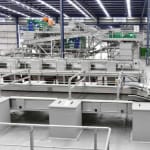
Mexico is one of the world’s ten biggest producers of Municipal Solid Waste on account of its vast size and large population. The country generates around 120,000 tonnes of waste a day, which add up to 44 million tonnes a year.
This situation has been further aggravated by an increase in waste (estimated at between 3.3 and 16.5% according to a study conducted by the Instituto Nacional de Ecología y Cambio Climático de México – the National Institute for Ecology and Climate Change) due to the country’s lockdown period, which has affected patterns in consumption and medical treatment. In this situation, the new sorting plants based on the automation of waste management, take on even greater importance for their potential to improve the environmental situation in Mexico and boost the circular economy.
“Stadler aims to be a driver in the change that Mexico needs to achieve a green economy standard shaped by technological innovations and business models. Both will undoubtedly bring environmental, social and economic benefits,” explains Natalya Duarte, Sales Manager for Mexico at Stadler.
The new sorting plant inaugurated by Operadora de Ferrocarril y Manejo de Rellenos (OFMRS) is testament to this trend towards automation. This private company, which specialises in final disposal for MSW, has joined forces with Stadler to develop a plant in the city of Cuautla (Morelos, Mexico) capable of managing comprehensive waste treatment for 16 municipalities in Morelos and a small part of Mexico City.
“This project was born of the vision shared by OFMRS and Stadler on waste management. This vision has led to a technological proposal and the development of a new operating model,”, says Natalya Duarte. “The aim was to recover different types of recyclable packaging and materials and re-distribute them back into various production chains, as many times as possible. This innovative business and management model makes such projects feasible, as well as making them more profitable due to the highly-efficient sorting process and high purity levels of the materials.”
Crisóforo Arroyo, General Manager for the La Perseverancia landfill, underlines his confidence in Stadler: “Our decision to invest in the project with Stadler was not onlybased on their reputation as a serious leading German technology firm in the sector, but also on the fact that this comprehensive project was sustainable and took domestic market conditions into account.”
“This new plant fulfils our objectives on many levels: generating a purer biogas; reducing the carbon footprint; strategic alliances with firms that recycle and transform recycled input materials into green packaging; re-distribution of recycled input materials within a circular economy; and the creation of shared value based on sustainability and quality,” adds Crisóforo Arroyo.


